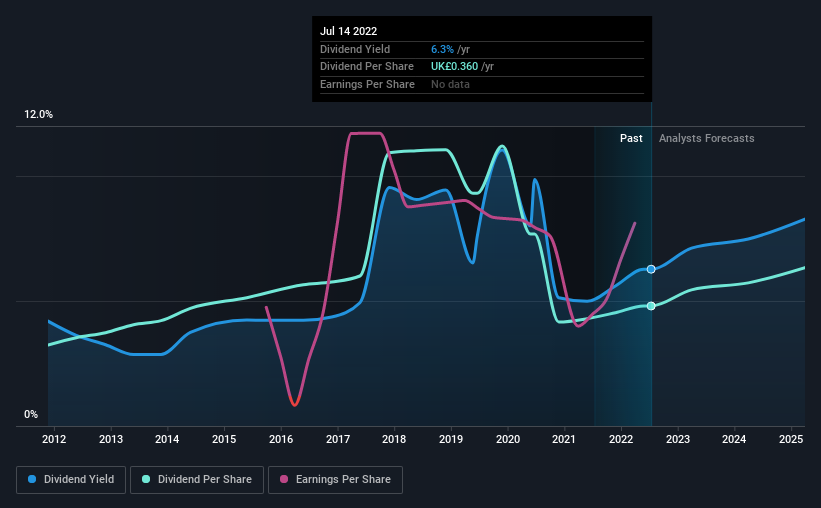- United Kingdom
- /
- Diversified Financial
- /
- LSE:PAY
PayPoint (LON:PAY) Is Paying Out A Larger Dividend Than Last Year

The board of PayPoint plc (LON:PAY) has announced that it will be paying its dividend of £0.09 on the 30th of September, an increased payment from last year's comparable dividend. This makes the dividend yield 6.3%, which is above the industry average.
View our latest analysis for PayPoint
PayPoint's Dividend Is Well Covered By Earnings
Impressive dividend yields are good, but this doesn't matter much if the payments can't be sustained. Based on the last dividend, PayPoint is earning enough to cover the payment, but then it makes up 210% of cash flows. This signals that the company is more focused on returning cash flow to shareholders, but it could mean that the dividend is exposed to cuts in the future.
Unless the company can turn things around, EPS could fall by 8.0% over the next year. If the dividend continues along recent trends, we estimate the payout ratio could be 63%, which we consider to be quite comfortable, with most of the company's earnings left over to grow the business in the future.

Dividend Volatility
While the company has been paying a dividend for a long time, it has cut the dividend at least once in the last 10 years. The annual payment during the last 10 years was £0.243 in 2012, and the most recent fiscal year payment was £0.36. This means that it has been growing its distributions at 4.0% per annum over that time. The dividend has seen some fluctuations in the past, so even though the dividend was raised this year, we should remember that it has been cut in the past.
Dividend Growth Is Doubtful
With a relatively unstable dividend, it's even more important to evaluate if earnings per share is growing, which could point to a growing dividend in the future. PayPoint has seen earnings per share falling at 8.0% per year over the last five years. If the company is making less over time, it naturally follows that it will also have to pay out less in dividends.
PayPoint's Dividend Doesn't Look Sustainable
In summary, while it's always good to see the dividend being raised, we don't think PayPoint's payments are rock solid. While PayPoint is earning enough to cover the payments, the cash flows are lacking. Overall, we don't think this company has the makings of a good income stock.
Companies possessing a stable dividend policy will likely enjoy greater investor interest than those suffering from a more inconsistent approach. At the same time, there are other factors our readers should be conscious of before pouring capital into a stock. For example, we've identified 4 warning signs for PayPoint (2 are concerning!) that you should be aware of before investing. If you are a dividend investor, you might also want to look at our curated list of high yield dividend stocks.
New: Manage All Your Stock Portfolios in One Place
We've created the ultimate portfolio companion for stock investors, and it's free.
• Connect an unlimited number of Portfolios and see your total in one currency
• Be alerted to new Warning Signs or Risks via email or mobile
• Track the Fair Value of your stocks
Have feedback on this article? Concerned about the content? Get in touch with us directly. Alternatively, email editorial-team (at) simplywallst.com.
This article by Simply Wall St is general in nature. We provide commentary based on historical data and analyst forecasts only using an unbiased methodology and our articles are not intended to be financial advice. It does not constitute a recommendation to buy or sell any stock, and does not take account of your objectives, or your financial situation. We aim to bring you long-term focused analysis driven by fundamental data. Note that our analysis may not factor in the latest price-sensitive company announcements or qualitative material. Simply Wall St has no position in any stocks mentioned.
About LSE:PAY
PayPoint
Engages in the provision of payments and banking, shopping, and e-commerce services and products in the United Kingdom.
Moderate with reasonable growth potential.
Market Insights
Community Narratives


